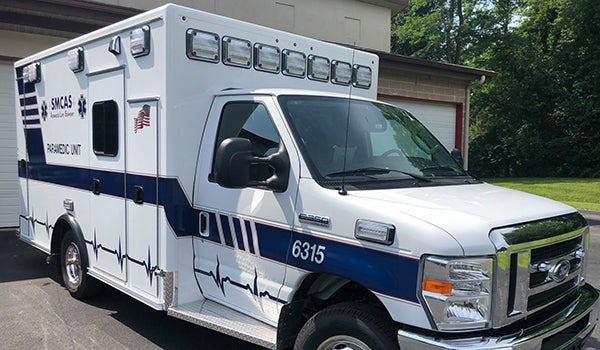Niles Township approves SMCAS special assessment district
Published 6:00 pm Wednesday, August 3, 2022

- (Leader File Photo)
|
Getting your Trinity Audio player ready...
|
NILES CHARTER TOWNSHIP — Township leaders have made a decision on a proposed increase in assessments for the local ambulance service.
Southwestern Michigan Community Ambulance Service is requesting a five-year step increase in the Special Assessment District rate – from $20 annually to $50 annually.
On Monday, the Niles Charter Township Board of Trustees passed a resolution authorizing a five-dollar increase in the SAD rate over the next two years – from $20 annually to $25 annually. A public hearing for the SAD has been set for 6 p.m. Tuesday, Sept. 6.
Township Clerk Terry Eull said the two-year period will allow the board to review cost projections to determine whether or not SMCAS’ recommendations are necessary.
“Five years in today’s times is a lot to try and project out,” Eull said. “I think that would give the board a couple years to see how this plays out.”
SMACS originally presented its proposal for an increase during the June 6 meeting. The non-profit, municipally-owned and operated advanced life support ambulance service has provided 24/7 emergency response in Southwest Michigan since 1976, serving residents within the Cities of Buchanan and Niles, as well as Buchanan, Niles, Howard, Bertrand, Milton and Pokagon Townships.
Currently, each parcel within the agency’s service area pays $20 per year to have Advanced Life Support level service on call 24/7. According to SMCAS, the rate has not increased in more than 25 years while operational costs and call volume have continued to climb without additional funding.
SMCAS is seeking an increased special assessment rate to ensure it can continue providing the high-level of skilled pre-hospital care residents expect. The additional funding would be used to recruit and retain new and existing staff, pay staff an industry standard for their work, and better cover operational costs. Scribner projects costs to increase 46 percent over the next five years.
“A lot of people looked at those wages and said ‘I don’t want to be a paramedic’,” Scribner said. “We are short more than 1,000 paramedics in the state. We have 300 people in training, or did; we have less than that now and based on some surveys that the Ambulance Association of Michigan did, we were facing a 33 percent attrition over the next couple of years.”
Trustee Chris Vela, who is the township’s chair in the SMCAS committee, voiced her support of both Scribner and SMCAS.
“This particular industry is very different from other business funds,” Vela said. “We need to understand that the pool from which they draw from is drying up. I think there is a lack of understanding with this business model.”
Because of that attrition, Scribner believes the competition for paramedics to be fierce. He said SMCAS salaries are 9 percent lower on its bottom scale and 15 percent lower on the top of its scale compared to local ambulance service Medic 1. Van Buren EMS pays 36 percent higher on its bottom scale than SMCAS and 38 percent higher on its top.
“We’re going to have a shortage of paramedics in this state and we’re all going to be competing for those paramedics,” he said. “Those are the numbers I’m concerned about, but our folks are committed and I think they love our organization. We’ve never been short staffed before. We’ve never been the highest paying and we’re not trying to get to the highest paying. We’re trying to keep us in a range so these folks don’t say ‘I have a family and there are other places that will pay me more.’ That’s what we’re working out right now.”
Township Treasurer Jim Ringler, who was the acting chair in Township Supervisor Jim Stover’s absence on Monday, reminded Scribner that in the event that the township’s resolution does not cover the costs accrued by SMCAS, the township would pay the difference for its share of SMCAS using the general fund.
“Tonight, what we’re doing is assessing the property owners,” he said. “You have to remember that our property owners have no say in this. It’s seven people speaking on behalf of more than 14,400 as to how we are going to do this.”
Several board members expressed that the lack of information provided by SMCAS about its wages and budget prevented them from accepting its proposal as-is.
“It’s hard to sit here and make a decision on behalf of things like that when we don’t have the information that we really need to,” said Trustee Jim Cooper. “We want to have all the facts that we possibly can to be able to make an intelligent decision.”
“We should have known about this increase months before we did,” Eull said. “In my opinion, we didn’t know that until way late in the ball game. We should have been one of the first to know that.”
Scribner remains undeterred in his goal to move SMCAS’ pay scales to a range that is competitive with agencies in the region.
“As long as they agree that they’re going to cover their part of whatever we need,” Scribner said. “There’s no question in my mind that we need everything we’ve asked for. I don’t have any doubt that that will play out and that’s the way this will go.”






